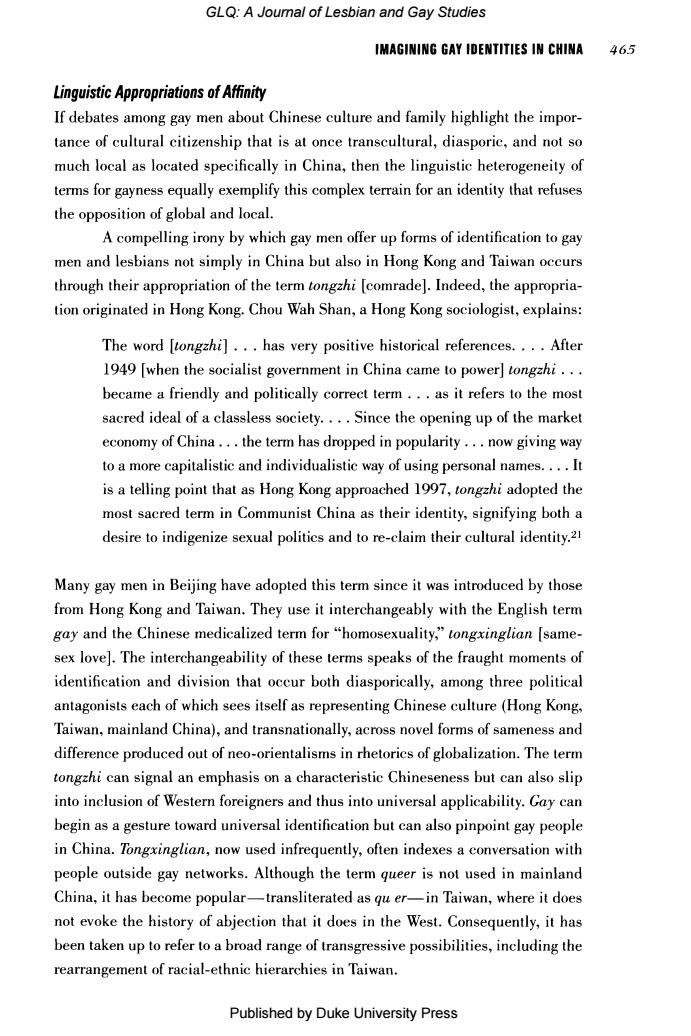正在加载图片...

GLQ:A Joumal of Lesbian and Gay Studies IMAGINING GAY IDENTITIES IN CHINA 46.5 Linguistic Appropriations of Affinity If debates among gay men about Chinese culture and family highlight the impor- tance of cultural citizenship that is at once transcultural,diasporic,and not so much local as located specifically in China,then the linguistic heterogeneity of terms for gayness equally exemplify this complex terrain for an identity that refuses the opposition of global and local. A compelling irony by which gay men offer up forms of identification to gay men and lesbians not simply in China but also in Hong Kong and Taiwan occurs through their appropriation of the term tongzhi [comrade].Indeed,the appropria- tion originated in Hong Kong.Chou Wah Shan,a Hong Kong sociologist,explains: The word [tongzhi]...has very positive historical references....After 1949 [when the socialist government in China came to power]tongzhi... became a friendly and politically correct term...as it refers to the most sacred ideal of a classless society....Since the opening up of the market economy of China...the term has dropped in popularity...now giving way to a more capitalistic and individualistic way of using personal names....It is a telling point that as Hong Kong approached 1997,tongahi adopted the most sacred term in Communist China as their identity,signifying both a desire to indigenize sexual politics and to re-claim their cultural identity.21 Many gay men in Beijing have adopted this term since it was introduced by those from Hong Kong and Taiwan.They use it interchangeably with the English term gay and the Chinese medicalized term for"homosexuality,"tongxinglian [same- sex love].The interchangeability of these terms speaks of the fraught moments of identification and division that occur both diasporically,among three political antagonists each of which sees itself as representing Chinese culture(Hong Kong, Taiwan,mainland China),and transnationally,across novel forms of sameness and difference produced out of neo-orientalisms in rhetorics of globalization.The term tongzhi can signal an emphasis on a characteristic Chineseness but can also slip into inclusion of Western foreigners and thus into universal applicability.Gay can begin as a gesture toward universal identification but can also pinpoint gay people in China.Tongxinglian,now used infrequently,often indexes a conversation with people outside gay networks.Although the term queer is not used in mainland China,it has become popular-transliterated as qu er-in Taiwan,where it does not evoke the history of abjection that it does in the West.Consequently,it has been taken up to refer to a broad range of transgressive possibilities,including the rearrangement of racial-ethnic hierarchies in Taiwan. Published by Duke University PressIMAGINING GAY IDENTITIES IN CHINA 465 linguistic Appropriations of Affinity If debates among gay men about Chinese culture and family highlight the importance of cultural citizenship that is at once transcultural, diasporic, and not so much local as located specifically in China, then the linguistic heterogeneity of terms for gayness equally exemplify this complex terrain for an identity that refuses the opposition of global and local. A compelling irony by which gay men offer up forms of identification to gay men and lesbians not simply in China but also in Hong Kong and Taiwan occurs through their appropriation of the term tongzhi [comrade]. Indeed, the appropriation originated in Hong Kong. Chou Wah Shan, a Hong Kong sociologist, explains: The word [tongzhi] . . . has very positive historical references. . . . After 1949 [when the socialist government in China came to power] tongzhi . . . became a friendly and politically correct term . . . as it refers to the most sacred ideal of a classless society. . . . Since the opening up of the market economy of China . . . the term has dropped in popularity . . . now giving way to a more capitalistic and individualistic way of using personal names. . . . It is a telling point that as Hong Kong approached 1997, tongzhi adopted the most sacred term in Communist China as their identity, signifying both a desire to indigenize sexual politics and to re-claim their cultural identity.21 Many gay men in Beijing have adopted this term since it was introduced by those from Hong Kong and Taiwan. They use it interchangeably with the English term gay and the Chinese medicalized term for “homosexuality,” tongxinglian [samesex love]. The interchangeability of these terms speaks of the fraught moments of identification and division that occur both diasporically, among three political antagonists each of which sees itself as representing Chinese culture (Hong Kong, Taiwan, mainland China), and transnationally, across novel forms of sameness and difference produced out of neo-orientalisms in rhetorics of globalization. The term tongzhi can signal an emphasis on a characteristic Chineseness but can also slip into inclusion of Western foreigners and thus into universal applicability. Gay can begin as a gesture toward universal identification but can also pinpoint gay people in China. Tongxinglian, now used infrequently, often indexes a conversation with people outside gay networks. Although the term queer is not used in mainland China, it has become popular-transliterated as qu er-in Taiwan, where it does not evoke the history of abjection that it does in the West. Consequently, it has been taken up to refer to a broad range of transgressive possibilities, including the rearrangement of racial-ethnic hierarchies in Taiwan. GLQ: A Journal of Lesbian and Gay Studies Published by Duke University Press